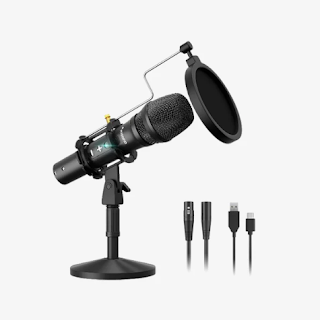Choosing the Perfect Singing Microphone for Recording
When it comes to recording vocals, having the right microphone can make a significant difference in the quality of your recordings. Whether you're a professional vocalist, podcaster, or content creator, selecting the ideal singing microphone for recording is crucial. Here's a guide to help you choose the perfect microphone for your singing needs:
Types of Singing Microphones:
Condenser Microphones:
singing mic for recording due to their sensitivity and ability to capture nuances in vocals.
Known for their clear and detailed sound reproduction, making them popular for professional recordings.
Require phantom power (48V) to operate, which is standard in most audio interfaces or mixers.
Dynamic Microphones:
Durable and versatile microphones suitable for live performances and studio recording.
Known for their ruggedness and ability to handle high sound pressure levels (SPL).
Require no external power source and are more forgiving of background noise.
Ribbon Microphones:
Known for their warm and vintage sound character.
Typically used for recording vocals in a controlled studio environment.
Require careful handling due to their delicate ribbon element.
Considerations for Choosing a Singing Microphone:
Budget:
Determine your budget range, as microphones vary greatly in price.
Quality condenser microphones can range from budget-friendly to high-end professional options.
Recording Environment:
If recording in a controlled studio environment, a sensitive condenser microphone may be ideal.
For live performances or home studios with background noise, a dynamic microphone can be a practical choice.
Vocal Characteristics:
Consider your vocal style and tone. Some microphones may complement certain vocal types better than others.
Test different microphones if possible to find the one that best suits your voice.
Usage:
Determine if you'll mainly be recording vocals or if you need a microphone for versatile use (e.g., instruments, podcasts).
Some microphones are designed specifically for vocals, offering enhanced clarity and presence.
Popular Singing Microphones for Recording:
Shure SM7B Dynamic Microphone:
A popular choice for both vocals and broadcasting.
Provides a warm and smooth sound with excellent noise rejection.
Ideal for recording vocals with its built-in windscreen and bass roll-off.
Audio-Technica AT2020 Condenser Microphone:
Budget-friendly option with professional-quality sound.
Known for its crisp and clear audio reproduction.
Suitable for studio vocals, podcasts, and acoustic instruments.
Rode NT1-A Condenser Microphone:
Studio-grade condenser microphone with a large diaphragm.
Delivers a detailed and transparent sound.
Includes a shock mount and pop filter for professional recording.
AKG C214 Condenser Microphone:
Versatile microphone suitable for vocals and instruments.
Offers a classic sound with a detailed midrange and extended low-frequency response.
Features a switchable low-cut filter and -20dB attenuation pad.
Blue Yeti USB Microphone:
Ideal for home recording setups and podcasting.
USB connectivity for easy plug-and-play operation.
Offers multiple polar patterns for different recording situations.
Tips for Recording with a Singing Microphone:
Proper Mic Placement:
Position the microphone at a distance that captures your voice clearly without picking up unwanted room noise.
Experiment with angles and distances to find the sweet spot for your voice.
Use a Pop Filter:
Reduce plosive sounds (like "p" and "b" sounds) by using a pop filter or windscreen.
This helps prevent unwanted bursts of air from distorting the microphone.
Room Acoustics:
Consider the acoustics of your recording space. If it's too reflective, use acoustic panels or blankets to reduce echo.
A well-treated room can greatly enhance the quality of your recordings.
Monitor Your Levels:
Keep an eye on your input levels to avoid clipping (distortion) or recording too quietly.
Adjust the gain on your audio interface or mixer to get optimal levels without clipping.
Experiment and Listen:
Every microphone and voice combination is unique. Spend time experimenting with different microphones and settings to find your perfect sound.
Use headphones to monitor your recordings and make adjustments as needed.
Selecting the right singing microphone for recording is a personal choice that depends on your budget, vocal style, and recording environment. Whether you choose a dynamic, condenser, or ribbon microphone, each type has its own characteristics that can enhance your vocal recordings. Take the time to research and, if possible, try out different microphones to find the one that suits your voice and recording needs best.
For more info. visit us:


Comments
Post a Comment